Who Am I?
Hi! I'm Falaah. I'm an Engineer/Scientist by training and an Artist by nature, broadly interested in how technology shapes and is in turn shaped by society. I'm currently a fourth-year PhD student at NYU's Center for Data Science, supported by the Apple Scholars in AIML PhD fellowship. I'm extremely lucky to get to do two things I absolutely love to do: conducting fundamental interdisciplinary research on AI fairness and AI safety, and creating scientific comics (and other artwork) to disseminate the nuances of this work in a way that is accessible to a variety of (technical and non-technical) audiences. Check out the "Research" section of this page for information about completed and ongoing projects. Check out the "Art" section for links to all my ML comics, and other artwork.
News
Summer 2024: Spent the summer in the San Francisco Bay Area interning with the lovely folks at Apple MLR !
Summer 2023: Co-facilitating the third offering of the 'We Are AI' public education course, to NYU librarians and non-academic staff!
March 2023: Our work on the effect of automated data cleaning on model fairness has been accepted to the Special Track at IEEE ICDE'23!
October 2022: Our work on Fairness as Equal Opportunity has been accepted to ACM EAAMO'22 for an Oral presentation! Watch the recording here.
September 2022: Our Interactive Introduction to Causal Inference was accepted to the VISxAI Workshop at IEEE VIS!
Aug 2022: Our paper on Stability Auditing of Personality Prediction AI was accepted to the Special Edition on Fairness and Bias of the Data Mining and Knowledge Discovery Journal!
Summer 2022: Over the summer, the lovely folks over at the Civic Software Foundation commissioned a bunch of artwork for their newly re-vamped website! Check it out, and find out more about the awesome work they do :)
Summer 2022: We (R/AI) ran a 6-week summer research program in collaboration with the Ukranian Catholic University! #ScienceForUkraine. Check out the final project showcase here!
July 2022: Giving D&I talks at IEEE MDM 2022 (Video) and ACM DEBS 2022 (Video) !
September 2021: Started my PhD at NYU !
August 2021: New Superheroes of Deep Learning comic 'Machine Learning for Healthcare' is out now!
May-June 2021: We just released a brand new, public-facing comic series, titled 'We are AI'! It's a 5-volume primer on AI, blending the social, the legal and the technical, for anyone and everyone, and it accompanies R/AI's new public education course of the same name.
April 2021: Giving an invited talk titled "It's funny because it's true: confronting ML catechisms" at the 'Rethinking ML Papers' Workshop @ICLR 2021! Video recording here. (My talk starts at ~2:48:00)
April 2021: 'Fairness and Friends' has been accepted as an exhibit to the 'Rethinking ML Papers' Workshop @ICLR 2021! Video explainer here.
March 2021: Hosting 'Decoded Reality' - a collaborative, community brainstorm session about the role of Power in the creation of Responsible AI, at MozFest 2021 , based on my visual essay of the same name!
March 2021: Presenting 'Fairness and Friends' - a translation tutorial that bridges scholarship from political philosophy and fair-ML - with Julia Stoyanovich and Eleni Manis, at ACM FAccT 2021! Recording is available here.
Feb 2021: Data, Responsibly Comics Vol 2: 'Fairness and Friends' is out now!
Jan 2021: RDS Comics, Vol 1: 'Mirror, Mirror' has been translated into French!!!
Dec 2020: Facilitating the MAIEI x RAIN-Africa collaboration 'Perspectives on the future of Responsible AI in Africa' workshop.
Dec 2020: The Spanish edition of RDS Comics, Volume 1: 'Mirror, Mirror' is out now!!!
Nov 2020: Facilitating the 'Privacy in AI' Workshop , by MAIEI and the AI4Good Lab
Nov 2020: Excited to be speaking at the 'Ethics in AI Panel' by the McGill AI Society
Nov 2020: Giving an invited talk on 'Ethics in AI', based off of Decoded Reality, at the TechAide Montreal AI4Good Conference + Hackathon
Nov 2020: Speaking about our 'Data, Responsibly' Comic books at the Rutgers IIPL Algorithmic Justice Webinar, with Julia Stoyanovich and Ellen Goodman!
Oct 2020: 'Mirror, Mirror' and 'Decoded Reality' have been accepted to the Resistance AI Workshop at NeurIPS 2020!
Oct 2020: Started the "Superheroes of Deep Learning" comic series, with Zack Lipton! Volume 1: 'Machine Learning Yearning' is out now!
Research
The focus of my research is the question ``What does it mean for the outcomes of a data-driven system to be fair?'', and how do we encode this pluralistic concept into algorithms? There are several perspectives from which I am looking at this question. The first is to ground statistical fairness definitions in strong normative foundations. This involves deeply engaging with literature in both fair-ML and moral philosophy to uncover the value judgements encoded in different mathematical criteria.
Equality of Opportunity (EO) is a political philosophy doctrine that objects to morally irrelevant factors affecting people's access to desirable positions in society. This is a rich space of ideas with different doctrines taking different views about which factors are morally relevant and irrelevant to decision-making, and about how to correct for the effect of morally irrelevant factors. Further, different EO doctrines target different opportunities. For example, Rawls's doctrine focuses on developmental opportunities such as access to education. In-built into these doctrines is the nature of opportunity being allocated, and we can exploit this as one way to characterize context. A metric-to-doctrine mapping between fair-ML and political philosophy allows us to uncover the value judgements embedded into different statistical criteria, while the implicit doctrine-to-context mapping in EO doctrines presents us with a way to reason about the appropriateness of context-specific fairness criteria.
The second focus of my research is to study how technical definitions of fairness trade off against other properties of ML systems such as stability. The intuition is that we should only care about whether the outcomes of a decision-making system are ``equally good'' for all people (fair), if the outcomes are good to begin with. Put differently, a system that is completely arbitrary, i.e., always returns a random guess, is trivially fair, and so fairness considerations need to be complemented with other important measures of predictive performance.
Validity is one such important property. We interrogated the validity of two real-world personality prediction AI used in hiring (called Crystal and HumanticAI, and advertised to be used by several Fortune 500 companies) by looking at the stability of the outputs they produce. One (among several) shocking findings of our paper was that these systems produce arbitrarily different scores for resumes that are identical in every other manner except file type (pdf vs rich text)! This finding illustrates that if outcomes are arbitrary then it is meaningless to think about fairness.
Github: https://github.com/DataResponsibly/hiring-stability-audit
From a conceptual standpoint, I'm also interested in the converse question: how do fairness interventions affect stability, i.e., does imposing fairness requirements make outcomes more (or less) arbitrary for certain social groups than for others? One way to think about this is through the lens of the elegant bias-variance decomposition of model error. I ask the question of whether this decomposition is different for different subgroups in the data.
The third line of my work focuses on how different data interventions in the model lifecycle affect the fairness and arbitrariness of predictions. This work takes a data-centric view, framing each stage in the lifecycle as a data transformation and studying its bias-transforming or variance-transforming effects.
It is a widely held socio-technical belief that data from socially marginalized groups tends to be more noisy, and this can manifest downstream as model unfairness. We interrogated this claim, and the impact of automating the detection and cleaning of data errors on model fairness. Counter-intuitively, we found that the incidence of automatically detected data errors --- missing values, outliers and mislabels --- does not track protected group membership, and yet the downstream impact of automated cleaning of these errors is more likely to worsen fairness than to improve it! We posit that this could be due to one or both of the following reasons: data errors for marginalized groups may be harder to detect or they may be harder to repair, impacting model fairness downstream. This result demonstrates the need to adopt a lifecycle view of fairness (e.g., to look at the interactions between error detection and data cleaning on downstream performance).
In this work we investigated the efficacy of a novel “who I am/how I behave” authentication paradigm. Conventional authentication works on a “what I know” (username/password) or “what I have” (device) model. Our system would study the user’s behavior while typing his/her username and use the activity profile as the key against which access was granted. This eliminated the need for the user to remember a password or have access to a registered device. Conversely, even if a password is cracked or a device is stolen, the bad actor would not be able to penetrate the system because his behavior would intrinsically differ from that of the genuine user.
CAPTCHAs, short for Complete Automated Public Turing Tests to tell Computers and Humans Apart, have been around since 2003 as the simplest human-user identification test. They can be understood as Reverse Turing Tests because in solving a CAPTCHA challenge it is a human subject that is appearing to prove his/her human-ness to a computer program.
Over the years we have seen CAPTCHA challenges evolve from being a string of characters for the user to decipher, to be an image selection challenge, to being as simple as ticking a checkbox. As each new CAPTCHA scheme hits the market, it is inevitably followed with research on new techniques to break these challenges. Engineers must then go back to the drawing board and design a new and more secure CAPTCHA scheme, which, upon deployment and subsequent use, is again, inadvertently subject to adversarial scrutiny. This arduous cycle of designing, breaking and then redesigning to strengthen against subsequent breaking, has become the de-facto lifecycle of a secure CAPTCHA scheme. This beckons the question; Are our CAPTCHAs truly “Completely Automated”? Is the labor involved in designing each new secure scheme outweighed by the speed with which a suitable adversary can be designed? Is the fantasy of creating a truly automated reverse Turing test dead?
Reminding ourselves of why we count CAPTCHAs as such an essential tool in our security toolbox, we characterize CAPTCHAs in a robustness-user experience-feasibility trichotomy. With such a characterization, we introduce a novel framework that leverages Adversarial Learning and Human-in-the-Loop Bayesian Inference to design CAPTCHAs schemes that are truly automated. We apply our framework to character CAPTCHAs and show that it does in fact generate a scheme that steadily moves closer to our design objectives of maximizing robustness while maintaining user experience and minimizing allocated resources, without requiring manual redesigning.
Machine Learnist Comics

Follow on Twitter , Facebook, Instagram and support on Patreon!
How to pick which comic to start with? The comics in this section are arranged in reverse-chronological order, but are from different series aimed at slightly different audiences. The "Superheroes of Deep Learning" comic series is a satirical take on the 'AI revolution' that we will be relatable to deep learning researchers. The "Data, Responsibly" comic series is for Data Science practitioners and students, and is meant to be a fun yet critical introduction to the 'Responsible AI' research agenda. The "We Are AI" comic series is aimed at the general public and uses accesible metaphors to explain the fundamental concepts of AI, covering technical, ethical and legal aspects.
Latest Volumes!
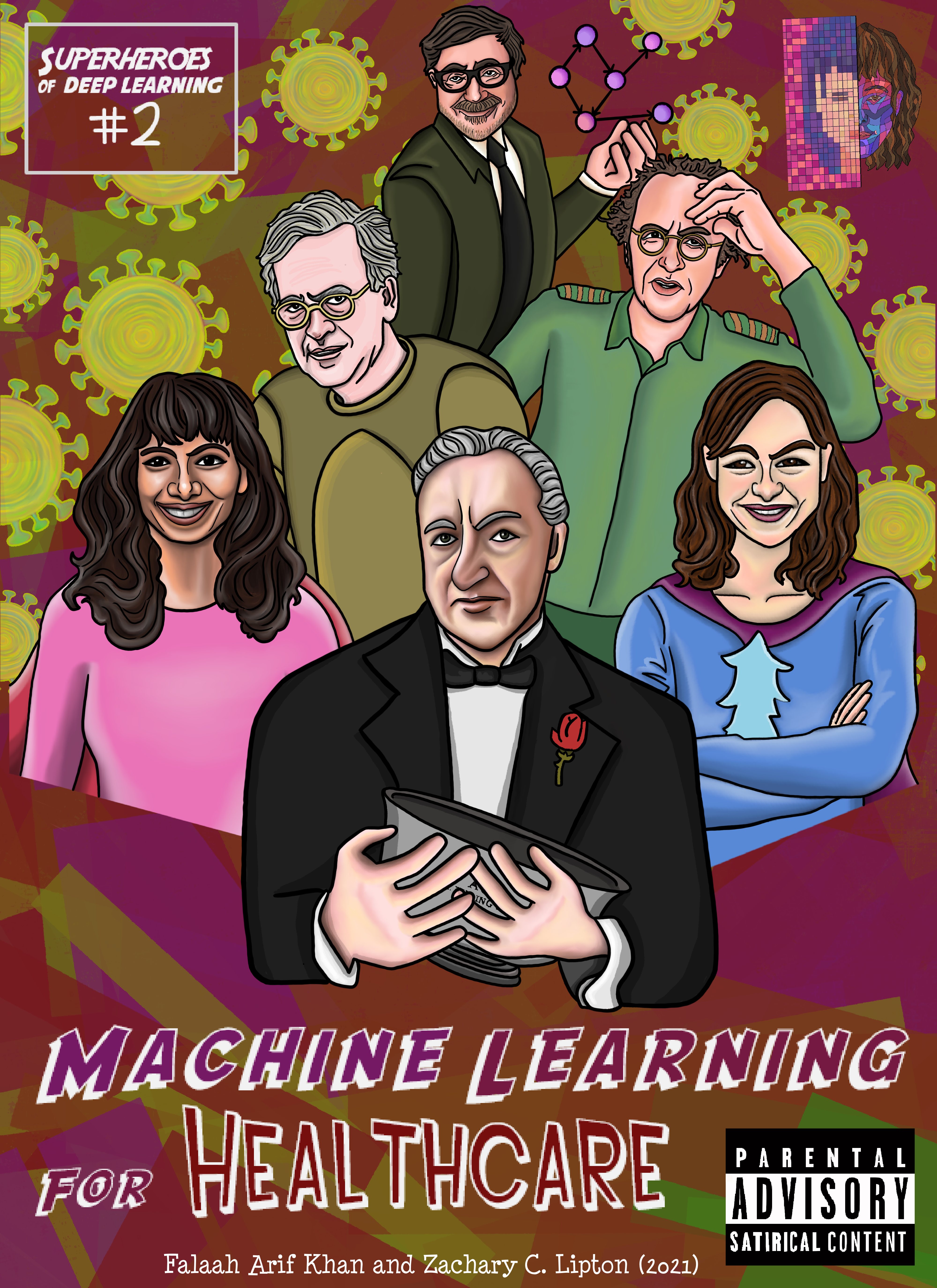
Falaah Arif Khan and Zachary C. Lipton. “Superheroes of Deep Learning Volume 2: Machine Learning for Healthcare” (August, 2021)
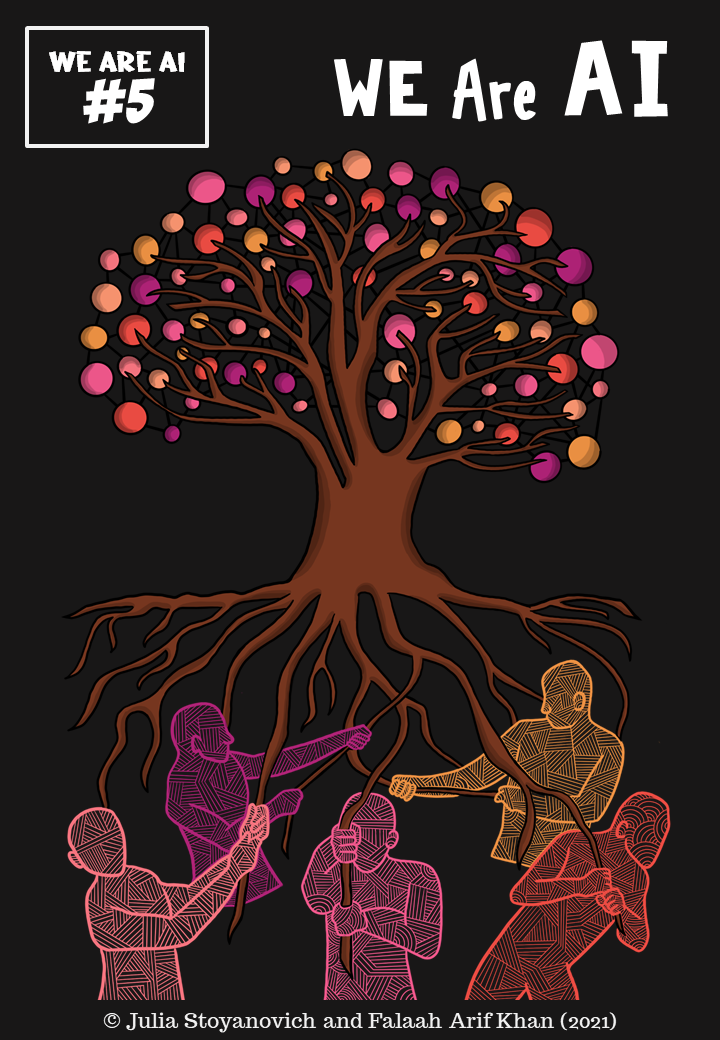
Julia Stoyanovich and Falaah Arif Khan. “We are AI”. We are AI Comics, Volume 5 (June, 2021)
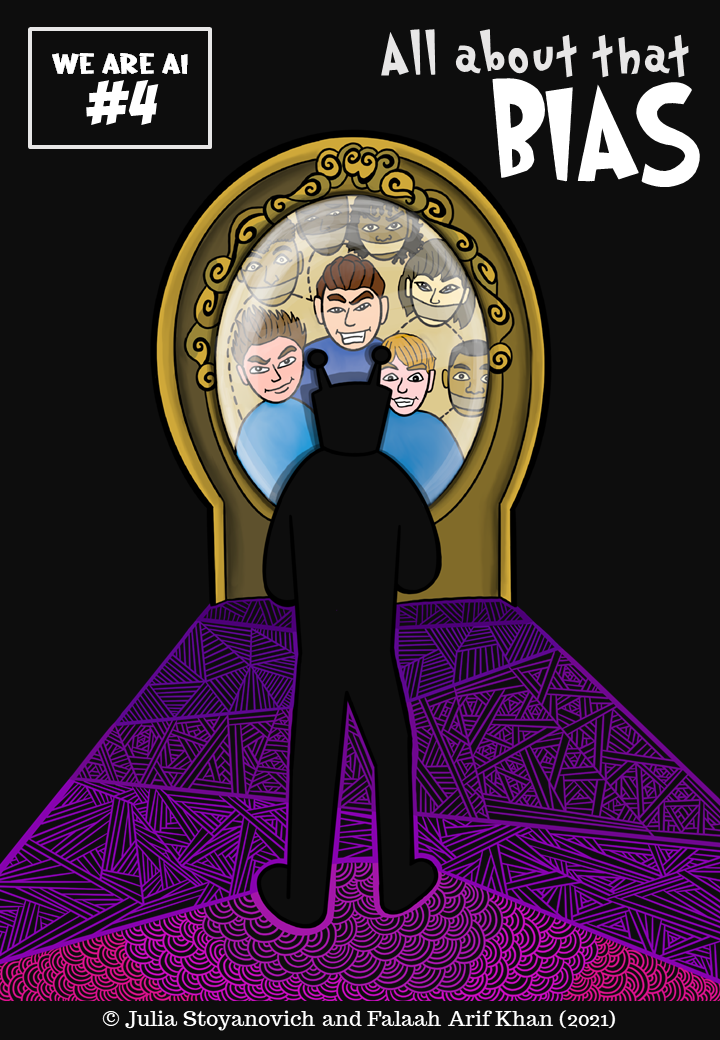
Julia Stoyanovich and Falaah Arif Khan. “All about that Bias”. We are AI Comics, Volume 4 (June, 2021)
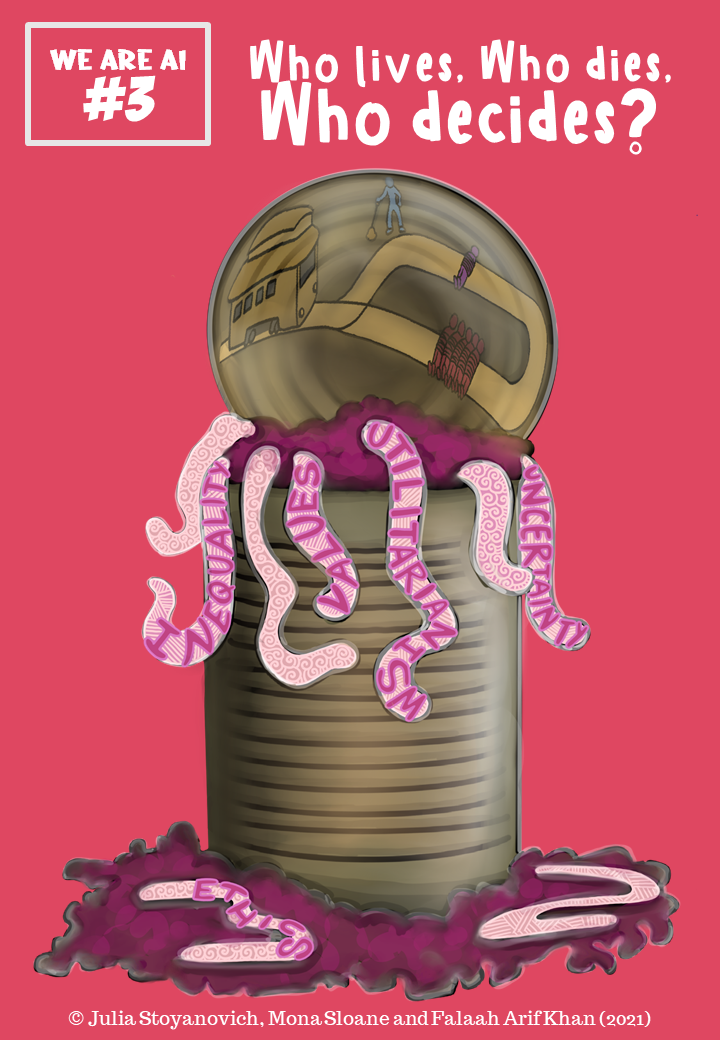
Julia Stoyanovich, Mona Sloane and Falaah Arif Khan. “Who lives, who dies, who decides?”. We are AI Comics, Volume 3 (May, 2021)
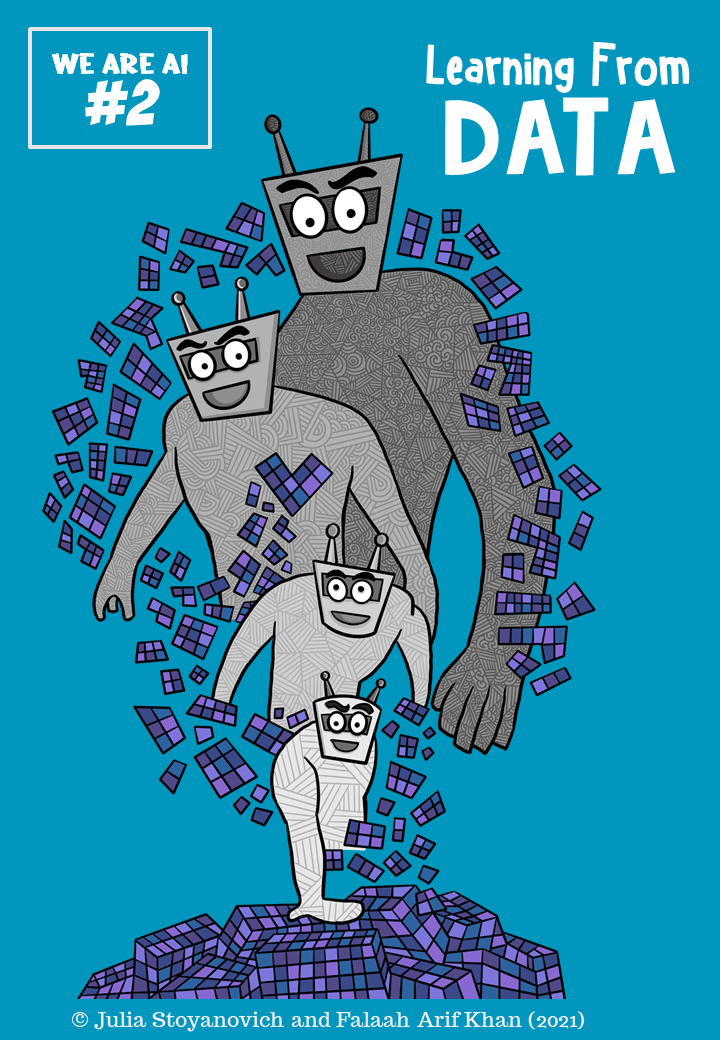
Julia Stoyanovich and Falaah Arif Khan. “Learning from Data”. We are AI Comics, Volume 2 (May, 2021)
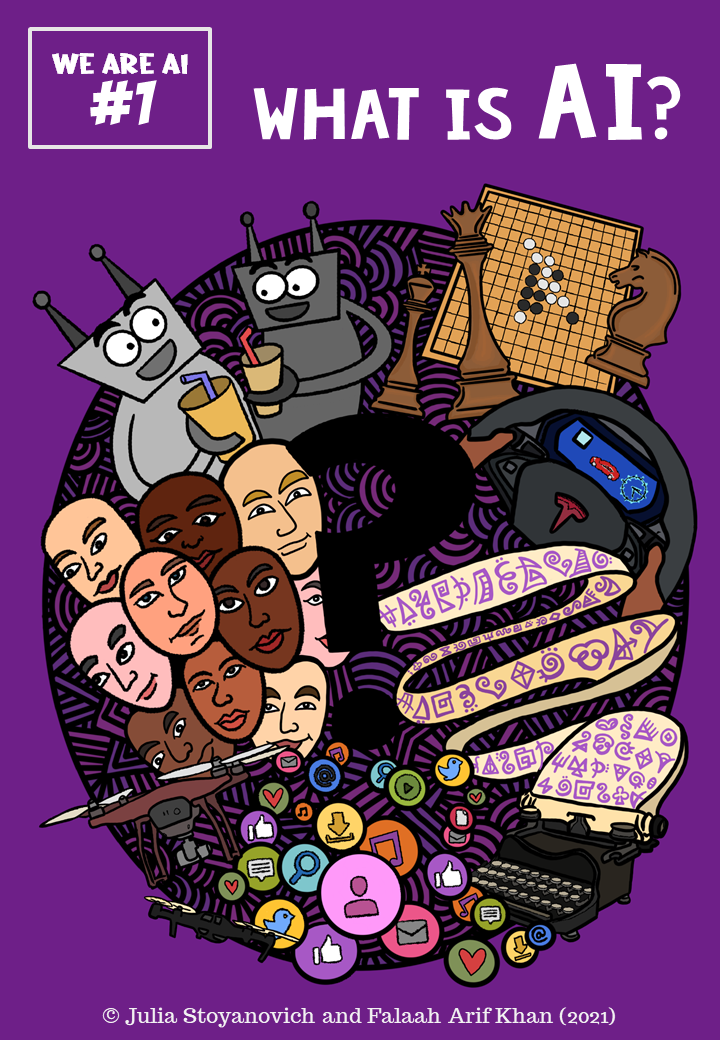
Julia Stoyanovich and Falaah Arif Khan. “What is AI?”. We are AI Comics, Volume 1 (May, 2021)
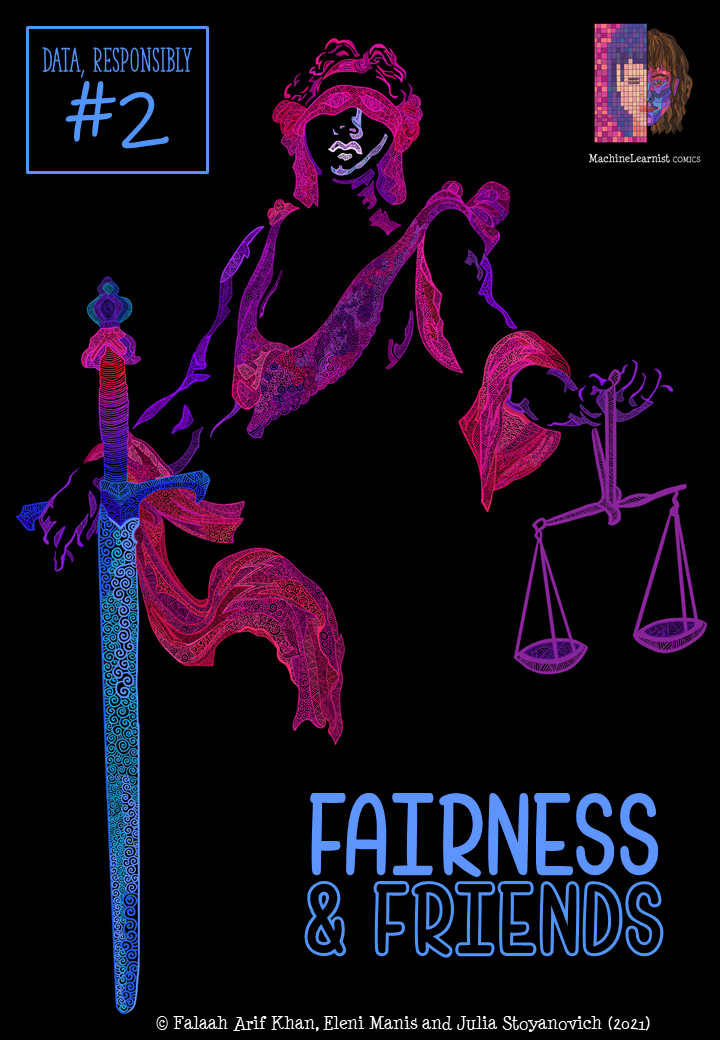
Falaah Arif Khan, Eleni Manis and Julia Stoyanovich “Fairness and Friends”. Data, Responsibly Comics, Volume 2 (Feb, 2021)
Falaah Arif Khan and Zachary C. Lipton. “Superheroes of Deep Learning Volume 1: Machine Learning Yearning” (Oct, 2020)
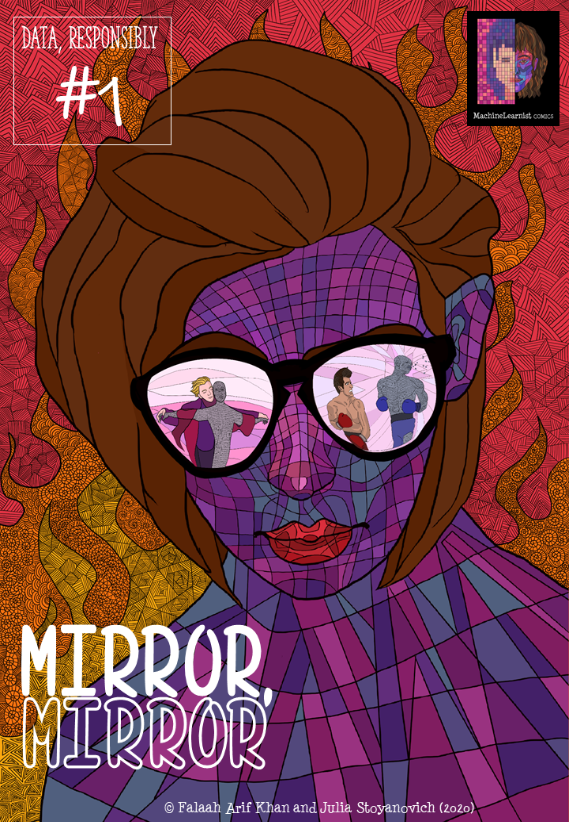
Falaah Arif Khan and Julia Stoyanovich. “Mirror, Mirror”. Data, Responsibly Comics, Volume 1 (Sept, 2020)
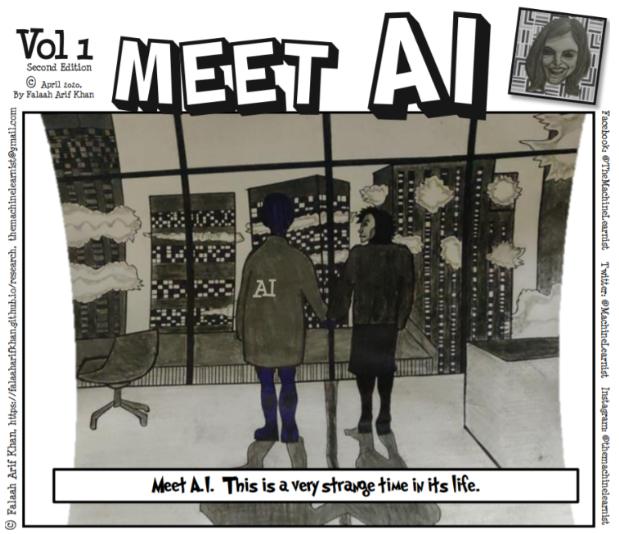
Falaah Arif Khan. "Meet AI" (June, 2020). In AAAI Interactive Magazine
Articles, Talks and More!
Interview with Hayat Life
I sat down with the folks at Hayat Life to talk about my ML comics - what inspired me to start making them, where I envision them going, and what to expect next!
RIIPL Algorithmic Justice Webinar Series
Julia and I sat down with Ellen Goodman, from the Rutgers Institute for Information Policy and Law, to discuss the comedic treatment of AI bias, normativity and exclusion, in the context of our 'Data, Responsibly' Comic books!
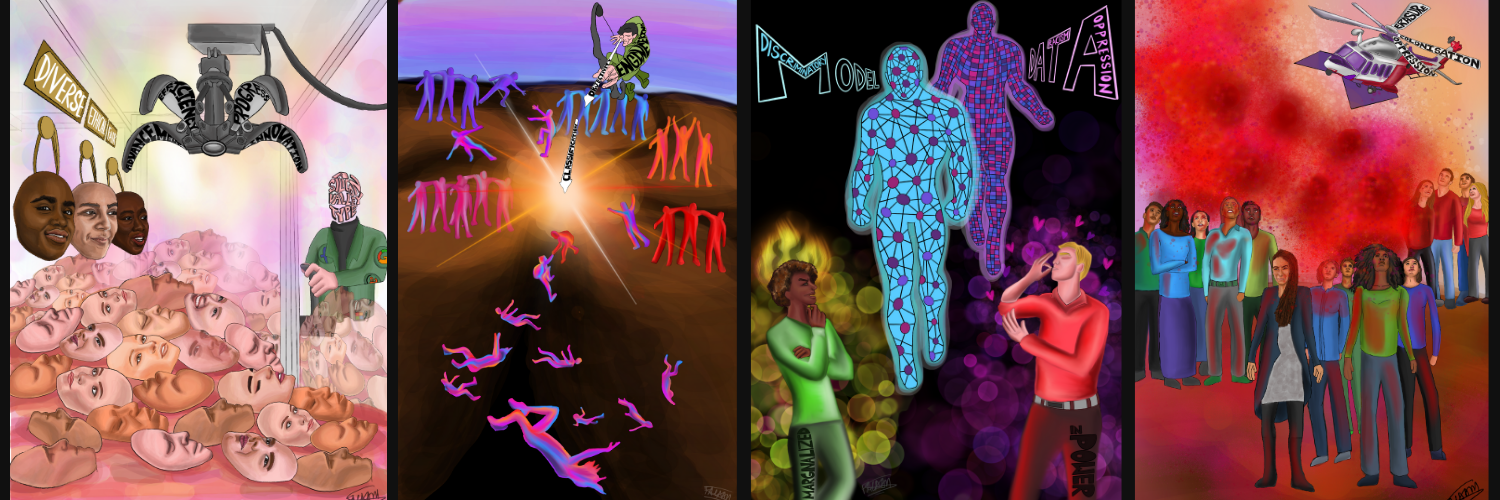
Decoded Reality
Decoded Reality is a visual essay on the power dynamics that shape the design, development and deployment of ML systems. We present artistic interpretations of how algorithmic interventions manifest in society in the hope of provoking the designers of these systems to think critically about the socio-political underpinnings of each step of the engineering process.
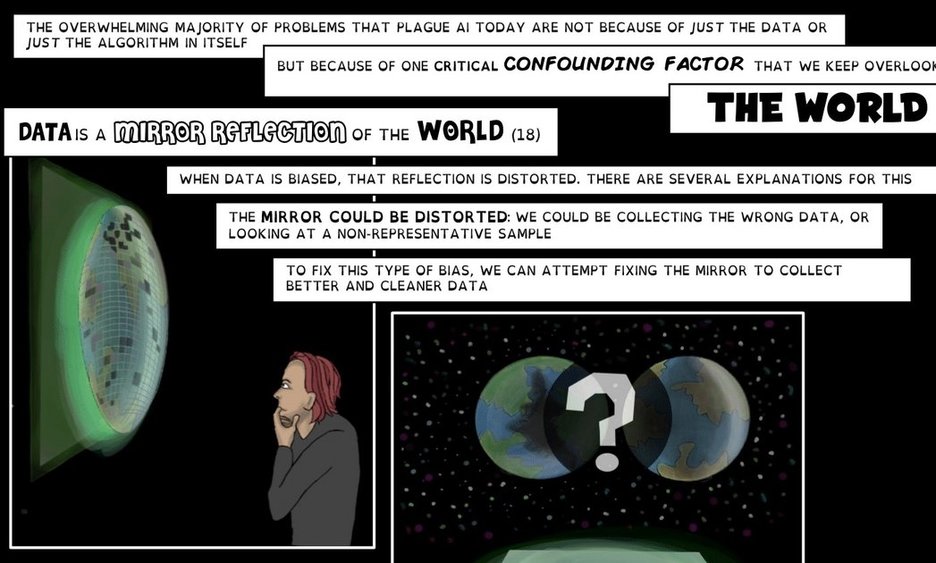
MetroLab "Innovation of the Month" Feature
"Mirror, Mirror" was featured as the MetroLab Network+ Government Technology "Innovation of the Month". In this interview we discuss the origins of the project, our creative process and the future of Data, Responsibly Comics!
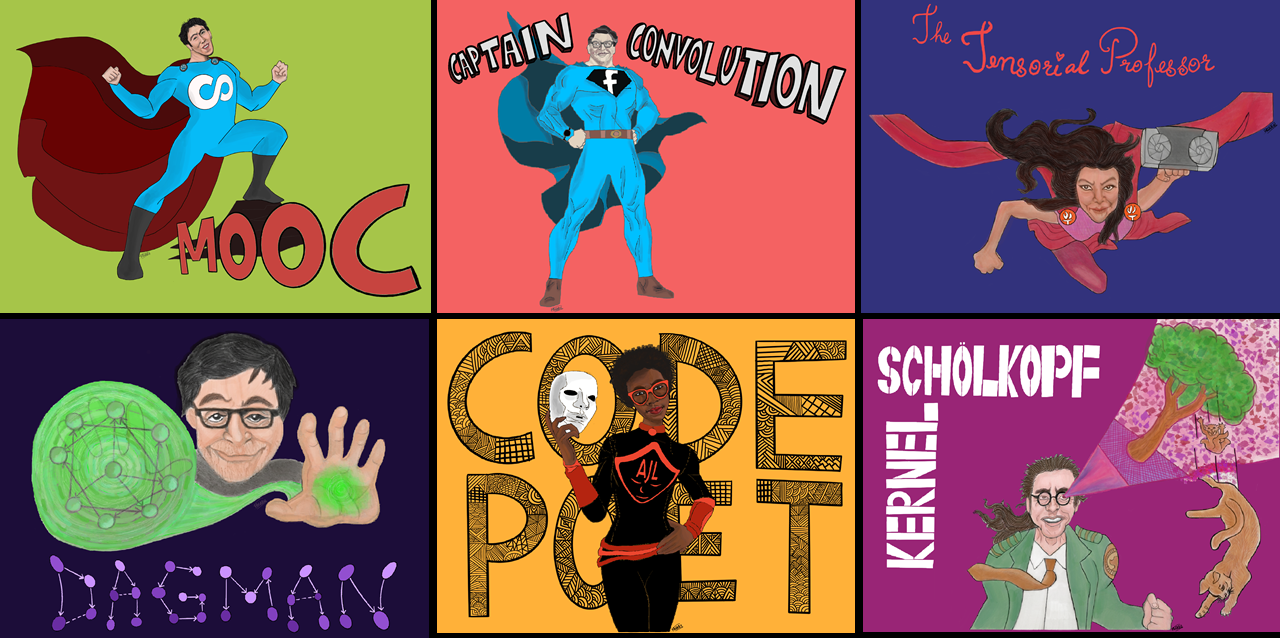
Hope Returns to the Machine Learning Universe
According to witnesses, Earth's been visited by the *Superheroes of Deep Learning*. What do they want? What powers do they possess? Will they fight for good or for evil? Read to learn more!.
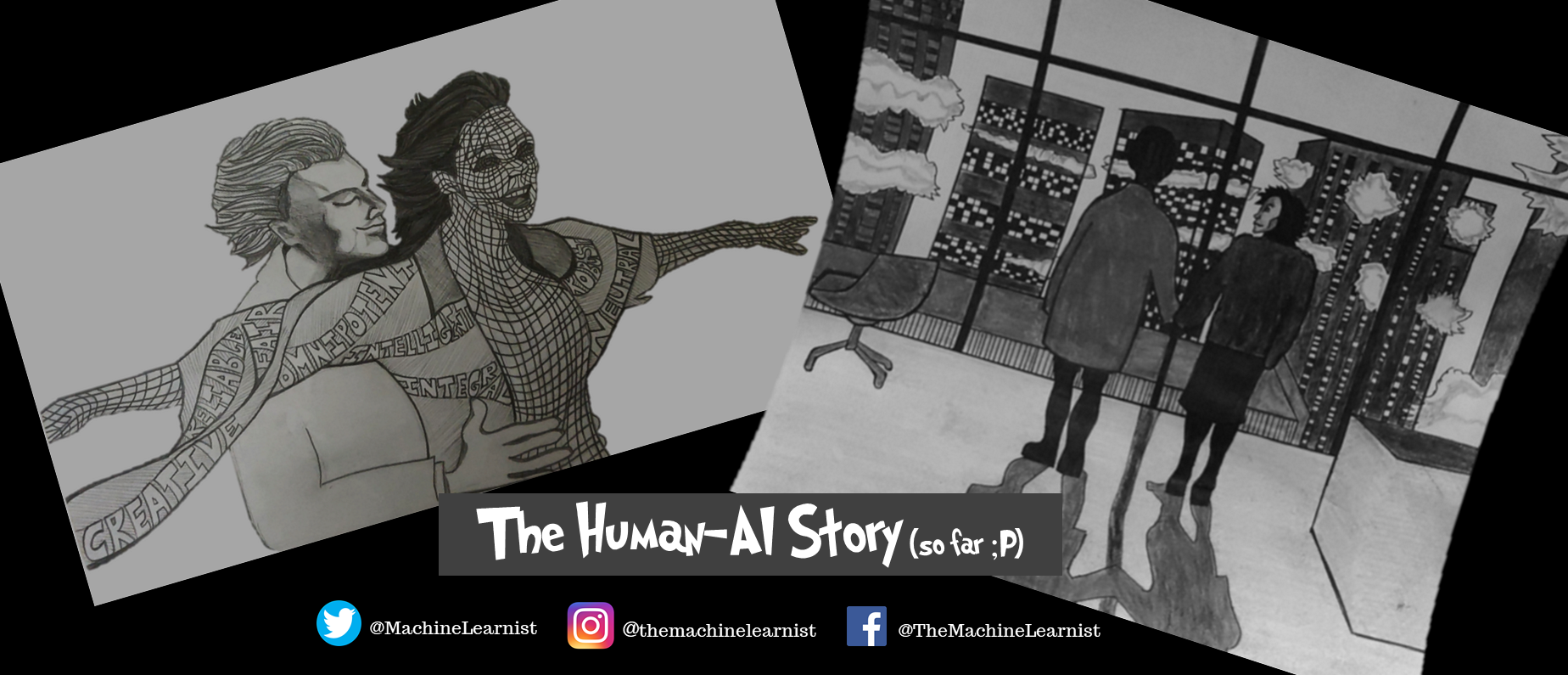
Interview with AI Hub
I sat down with the folks at AIHub to chat about my research and art. We talk (meta-)security, scientific comics and demystifying the hype around AI.
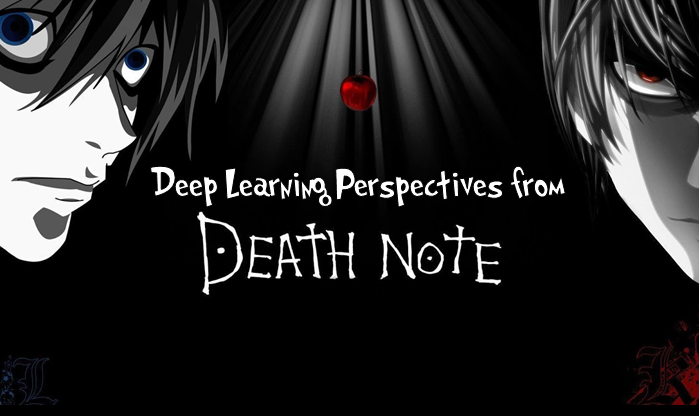
Deep Learning Perspectives from Death Note: Another Approximately Inimitable Exegesis
Masked under a binge-worthy anime lies an adept critique of the ongoing deep learning craze in the industry. Here’s my commentary on the technical symbols in Death Note.
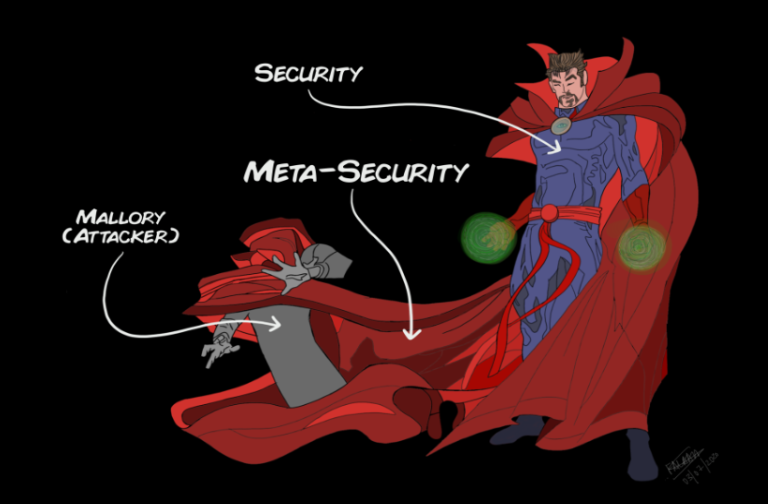
What is Meta-Security?
In this seminal essay, I explain the hottest up and coming sub-field of Machine Learning - Meta-Security!
Contact
Get in touch if you want to collaborate on interesting research, want to commission some custom artwork (but I must clarify that I'm not an illustrator/graphic designer, I'm an artist), or simply want to discuss something wonderfully esoteric!
